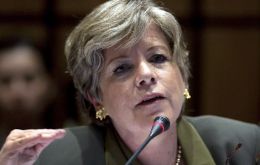MercoPress. South Atlantic News Agency
Tag: Latam
-
Wednesday, November 16th 2011 - 05:14 UTC
Argentine Vice President elect urges Latam countries to use local currencies

Argentine Economy Minister and Vice-President elect Amado Boudou urged Latin American countries to increase the use of local currencies in regional trade instead of depending on other currency such as the dollar.
-
Monday, November 14th 2011 - 18:19 UTC
Most Latam banks target the SME sector to expand business, shows survey

A large majority of banks in Latin America and the Caribbean consider small and medium-sized enterprise (SME) as a strategic part of their business and are upbeat about expanding their business to this sector in the next two years, according to the Latin American Banking Federation, Feleban.
-
Friday, November 11th 2011 - 08:32 UTC
Economist warns Latam to prepare for the chain effect of a Euro collapse

The Secretary-General of the Ibero-American Secretariat Enrique Iglesias, warned Thursday that the EU crisis could reach as far as Asia and Latin America, and that preventive measures should be taken.
-
Thursday, November 3rd 2011 - 14:44 UTC
Chile, Argentina and Uruguay with highest human development index in Latam

Chile, Argentina and Uruguay have the highest standards of living in Latin America according the latest report from the United Nations Human Development Index (HDI).
-
Tuesday, November 1st 2011 - 21:12 UTC
Latin America will demand at G20 summit greater voice for emerging economies

The Latin American block arrives this week at the G20 summit in Cannes with a consensus spearheaded by the strong political standing of Brazil in global affairs and with criticisms to the way in which the European Union and the US are managing their respective “crises”.
-
Tuesday, November 1st 2011 - 06:01 UTC
IberoAmerican summit a “failure”: Latam has its own voice in world affairs

Spanish media criticized harshly the latest Ibero-American summit in Paraguay last Saturday arguing that the non attendance of 11 of 22 leaders of the region can only be described as a failure of Madrid’s diplomacy and disrespect for the Spanish representatives.
-
Friday, October 28th 2011 - 20:39 UTC
Six our of fourteen of the world’s most violent countries are in Latin America

Six of the 14 most violent countries in the world are in Latin America revealed the second edition of the report “Armed Violence and Development” published Thursday in Geneva by the Secretariat from the Geneva Declaration on Violence and Development, a diplomatic initiative born in 2008.
-
Thursday, October 27th 2011 - 05:58 UTC
World Bank forecasts Latam growth of 3.5% to 4% this year and 4% in 2012

Latin America’s economy is forecasted to grow between 3.5% and 4% this year, which is less than previous estimates before the current global financial crisis, said World Bank representative for the region, Pamela Cox.
-
Wednesday, October 26th 2011 - 13:49 UTC
Top bankers praise Latam’s performance but beware effects of Euro crisis

Latin America is in a good financial situation, but the problems currently being suffered by the US and Europe poses a threat, according to the region’s banks federation, FELEBAN.
-
Tuesday, October 25th 2011 - 21:32 UTC
FDI in Latam expands 41% in 2011 first half; strong support from ‘trans-Latins’

In spite of global financial volatility during the first half of 2011, foreign direct investment (FDI) in Latin America and the Caribbean continued to grow maintaining the 2010 trend, according to a Tuesday release from the UN Economic Commission for Latin America and the Caribbean, ECLAC, in Santiago de Chile.
